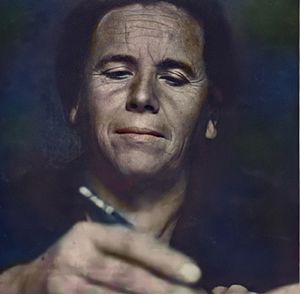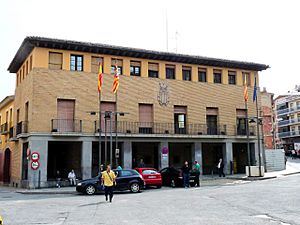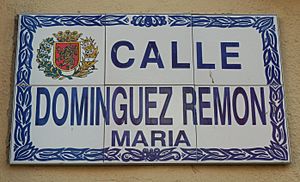María Domínguez Remón facts for kids
Quick facts for kids
María Domínguez
|
|
|---|---|

María Domínguez Remón, Now Magazine, 10-27-1932
|
|
| Born |
María Domínguez Remón
1 April 1882 Pozuelo de Aragón, Spain
|
| Died | 7 September 1936 (aged 54) Fuendejalón, Spain
|
| Cause of death | Gunshot |
| Other names | Imperia, María la tonta |
| Occupation | Journalist, poet, politician |
| Known for | First democratic mayor in Spain |
| Political party | Socialist |
| Spouse(s) |
|
María Domínguez Remón (born April 1, 1882 – died September 7, 1936) was an amazing Spanish journalist, poet, and politician. She believed in a republic, which is a country run by elected officials, not a king. She was also a socialist, meaning she believed in fairness for all people. In 1932, she made history. She became the first woman to be a democratic mayor in Spain. This happened in the town of Gallur, Zaragoza, during the Second Spanish Republic. Sadly, she was killed at the start of the Spanish Civil War.
Contents
Early Life and Challenges
María Domínguez grew up in a poor farming family. She was the second daughter. She only went to school for a few years. Because of this, she taught herself most of what she knew.
When she was 18, she was forced to marry Bonifacio Ba Cercé. After seven years, she was tired of being treated badly. She bravely ran away to Barcelona. There, she worked as a maid.
Later, María returned to her hometown, Pozuelo de Aragón. She used her savings to buy a machine that made hosiery (like stockings). This helped her earn a living.
Becoming a Writer and Politician
In Pozuelo de Aragón, María started to write. She sent an article to a newspaper in Madrid called El País. They liked it and published it! She also tried to become a teacher. She took an exam in 1914 but didn't pass.
She moved to Zaragoza. At night, she took classes at the School of Arts and Crafts. During the day, she sewed stockings at home. Soon, María became a regular writer for a newspaper called Ideal de Aragón. This paper supported the idea of a republic. She wrote under the pen name Imperia.
In 1917, she taught for a few months in a school in a small village. She had to leave because she got sick. But she still managed to pass teaching exams in Pamplona. She then became very ill with the 1918 flu pandemic. She was in bed for over a year.
After recovering, she worked as a maid for a politician named Venancio Sarría.
New Beginnings in Gallur
In 1922, María's first husband passed away. She then married Arturo Segundo Romanos, who was a sheep shearer. They settled in Gallur. There, they both joined the Unión General de Trabajadores (UGT). This was a big workers' union. They joined after a time when Spain was ruled by a dictator.
María also wrote for a socialist newspaper in Zaragoza called Vida Nueva. Her first article appeared in May 1930. After April 1931, she worked hard to promote women's rights, socialism, and the republic. In her writings, she defended the new republic. She fought against "enemies of democracy." She also spoke about the important role women should play. She bravely pointed out unfair situations.
Mayor of Gallur (1932-1933)
In July 1932, something big happened in Gallur. The local government, chosen in 1931, resigned. This was due to public pressure and political problems.
The government official for the province chose María Domínguez to lead a special committee. This made her the first woman to be in charge of a mayor's office in Spain! She was the mayor of Gallur from July 29, 1932, to February 6, 1933.
What She Achieved as Mayor
During her time as mayor, María did many great things:
- She made sure the new laws of the Republic were followed.
- She created jobs in the countryside to help people who were unemployed.
- She set up a single school for both boys and girls. Before, they were often separate.
- She gave money to teachers to hire cleaners. This meant children didn't have to clean the schools themselves.
- She approved money for coal. This meant children didn't have to carry coal home from school for heating.
- She also approved money to fix up schools. She wanted them to be better places for learning.
In 1932, she attended a big meeting of the UGT union. She even served as a secretary for one of the sessions.
On February 6, 1933, María had to leave her position. A new law meant that the special committees she led were replaced. She was happy with what she had done. But she was also a bit sad and tired because her efforts were sometimes criticized.
Final Years (1933-1936)
After being mayor, María went back to teaching. She also kept writing for newspapers. Her articles were strong and smart. They were full of humor and showed her unique way of seeing the world. Sometimes, she signed her articles with the name María la tonta, which means "María the fool." This was her way of being ironic.
She believed in many important things:
- Equality for women.
- Freedom to think what you want.
- Everyone having the right to vote.
- Fighting against unfair treatment.
- Being free from old ways of thinking about culture and religion.
- The power of education and learning to make things better.
- Being brave.
- Love that is chosen freely, not forced.
- Turning good ideas into real actions.
In 1934, a book called Opiniones de mujeres (Opinions of Women) was published. It included four of her speeches. These speeches talked about feminism, women's roles, socialism, and the Republic.
Death
In July 1936, a military coup started the Spanish Civil War. María Domínguez went to her sister's house in Pozuelo de Aragón to be safe. But a few days later, she was arrested. On September 7, 1936, she was shot by soldiers who supported Franco. This happened near the cemetery in Fuendejalón, a nearby town. Her husband, Arturo Romanos, was also shot shortly after in another town.
In February 2021, scientists found bones in the Fuendejalón cemetery. They confirmed that these were María Domínguez's remains.
Quotations
Here are some powerful things María Domínguez said:
- "Only constant work to promote women's rights could make the dream of equality between boys and girls come true."
- "By sharing knowledge at any level, we can change society."
- "I do not have to be a slave to anyone."
- "I give my life to the Republic and I will not give up, even when I am disappointed."
Documentary
In January 2015, a film director named Vicky Calavia released a documentary. It was called María Domínguez. La palabra libre (María Domínguez. The Free Word). Many people helped make this film.
Recognition
In 1999, the Provincial Council of Zaragoza gave María Domínguez a special medal. It was given after her death to honor her.
The city of Zaragoza named a street after her. It used to be named after a general who supported Franco.
The local school in Gallur and one of its streets are also named after María Domínguez.
There is a foundation in Zaragoza named after her, called the María Domínguez Foundation. It belongs to the Spanish Socialist Workers' Party.
In Gallur, there is also the María Domínguez Women's Association. This group helps women and serves the community.
See also
 In Spanish: María Domínguez para niños
In Spanish: María Domínguez para niños



